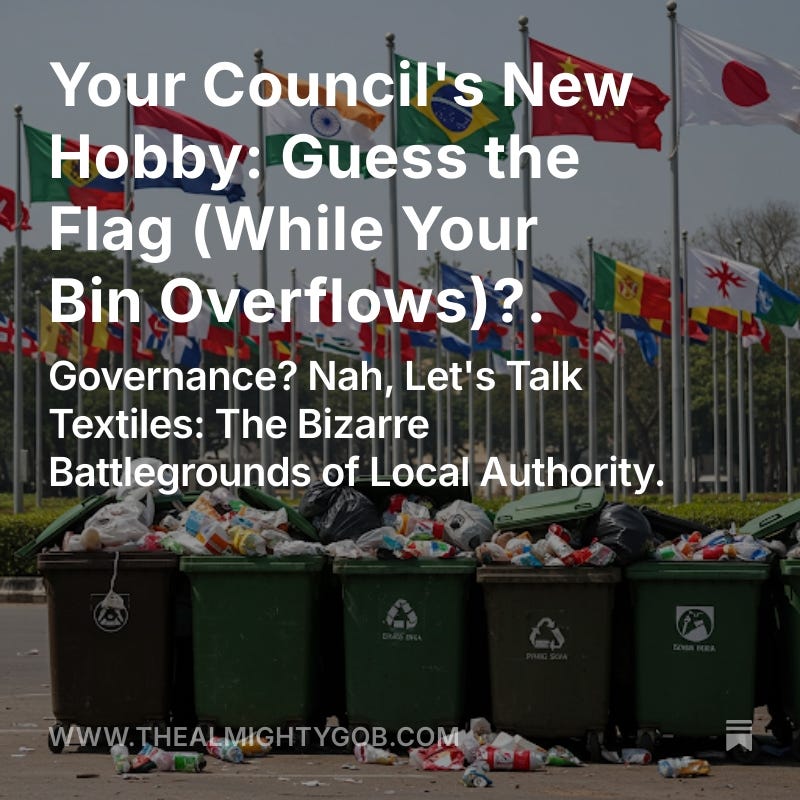Your Council's New Hobby: Guess the Flag (While Your Bin Overflows).
Governance? Nah, Let's Talk Textiles: The Bizarre Battlegrounds of Local Authority.
Just when you thought our esteemed local authorities were swamped with the frankly overwhelming task of, you know, actually governing – ensuring bin lorries grace our streets (occasionally), smoothing out the ever-expanding network of road craters, and maybe casting a fleeting glance at social care – a dazzling new distraction has unfurled itself: flags.
Yes, those vibrant squares of fabric that typically denote national identity or a spirited village fete have become the latest ideological battleground in local councils. Forget the housing crisis; let's debate saffron! Ignore crumbling pavements; bring on the bunting bonanza! One can almost picture the council meetings: weighty tomes on sewage management gathering dust as fervent discussions erupt about the Welsh dragon versus the Yorkshire rose.
The sheer randomness of it all astounds. It’s as if they’ve installed a giant tombola in the Mayor's parlour, and whichever nation or cause pops out gets their emblem flying proudly before being swapped for something entirely unrelated. Wouldn't you raise a sceptical eyebrow at the flag of a micronation known for its stamp collection one day, followed by a banner for artisanal pickles the next?
Now, Reform UK has charged into this colourful commotion with a proposal that actually possesses a minuscule kernel of "common sense." Their suggestion? A flaggy fiscal responsibility drive: the Union Jack, the St George's Cross, and your local county flag – that’s your lot. No more daily debates about which obscure international grievance deserves a temporary spot, potentially sidelining the fiercely proud white rose of Yorkshire or the red rose of Lancashire.
Predictably, this has sent the usual suspects into their customary spirals of indignation. Labour is lamenting the potential silencing of international voices, seemingly forgetting that Yorkshire and Lancashire have perfectly eloquent symbolic voices of their own. The Conservatives, after a brief wobble regarding county flags, are now nodding along with newfound enthusiasm.
But here’s where my inner cynic finds a peculiar resonance with Reform's blunt pronouncement. Aren't local councils supposed to be local? Shouldn't their primary focus be on the nitty-gritty tasks that directly impact residents, rather than potentially slighting the symbolic importance of a Yorkshire rose or a Lancashire red rose? Bristol City Council, as reported in December 2023, had enthusiastically embraced flag-flying – solidarity flags, celebratory flags, flags in response to public campaigns. The upshot? A proper Bristolian barney, with understandable accusations of bias and questions about why one nation's flag should get precedence over the white rose of Yorkshire or Bristol's somewhat bizarre emblem.
Consider City Hall being bathed in the colours of the Israeli flag. Cue the digital pitchforks from Palestine supporters, demands for reciprocal displays, and accusations of blatant favouritism. It's a classic lose-lose situation. One person's heartfelt symbol of empathy is another's perceived endorsement of a divisive political stance. In trying to please everyone, the council often ends up pleasing few and infuriating many, potentially even those with affection for the symbols of Yorkshire and Lancashire.
Now, let's tip the overflowing wheelie bin of Bristol’s Low Traffic Neighbourhood (LTN) saga into this mix. Ah, LTNs. The mere utterance of those three letters is enough to send a shiver of frustration through the average Bristolian. The theory is to cultivate "liveable" neighbourhoods by curbing through-traffic.
The reality, however, has been about as palatable as week-old fish and chips ask the owner of Lawrence Hill’s ‘Hamblins’ chippy, and he’ll no doubt tell you in no uncertain terms. The implementation of LTNs across our city has been a masterclass in irritation. Accusations of a lack of consultation, installations that materialised overnight, and a catalogue of unintended consequences have left communities feeling isolated and traffic resembling a Bank Holiday car park, likely mirroring similar traffic-induced tantrums in Yorkshire and Lancashire.
We've had credible reports of fire engines engaging in a frustrating dance with bollards. Residents have recounted isolation, local businesses have lamented dwindling footfall, and journey times have ballooned. The sheer annoyance is tangible. It's become a potent symbol of a council seemingly more enamoured with pushing an agenda than heeding the concerns of the people they serve, potentially even overlooking local community pride.
The Great Disconnect: Pennants v Potholes.
So, we arrive at this bizarre juncture. On one hand, a council seemingly hyper-sensitive to the symbolic power of flags, eager to weigh in on global events and local sentiments through brightly coloured cloth, potentially at the expense of acknowledging deeply ingrained cultural significance. On the other hand, when it comes to something with a tangible, daily impact – like navigating the city, or the pride of Yorkshire and Lancashire folk in their county emblems – a more heavy-handed, "we know best" approach has generated widespread fury and division.
It's almost darkly comical. They'll dedicate hours to debating the precise shade of azure on a solidarity flag while potentially overlooking the symbolic importance of flying the white rose of Yorkshire with the same respect. But when it comes to implementing traffic schemes that fundamentally reshape daily lives, it often feels like they've charged in with the grace of a bull in a china shop, leaving public exasperation in their wake, perhaps even sparking "Not in my backyard!" sentiments that would resonate strongly in Yorkshire and Lancashire.
Perhaps Reform UK, in their characteristically unsubtle way, have inadvertently stumbled upon a fundamental truth: maybe local authorities should prioritise the prosaic over the performative, and perhaps even acknowledge the deeply held regional pride embodied by flags like those of Yorkshire and Lancashire. Less time spent pondering pennants that might inadvertently slight regional identities, more time spent actually running the locality. Imagine! A council meeting where the primary focus is the frankly terrifying state of public transport, rather than whether the flag of a Middle Eastern country should take precedence over the iconic symbols of Yorkshire and Lancashire. A truly revolutionary concept, I know.
So, here we are, folks, in the grand theatre of British local governance, where the latest dramatic production is a spirited (and occasionally baffling) debate over…flags. Yes, flags. Apparently, the burning issue isn't overflowing bins, the infinite proliferation of potholes, or the general sense of a vaguely dystopian future. No, it's which bits of coloured cloth get to flutter proudly, potentially overlooking the deeply ingrained pride associated with county flags like those of Yorkshire and Lancashire.
So, that said, Reform UK, in their delightfully direct way, have decided to wade into this sartorial squabble, proposing a grand flaggy rationalisation: Union Jack, St George's Cross, and your undeniably significant local county flag. No more international solidarity banners that might inadvertently overshadow local pride, no more cultural celebration pennants that might ruffle fiercely regional identities, just good old-fashioned national and local emblems, including, crucially, the white rose of Yorkshire and the red rose of Lancashire. And, predictably, this has sent the usual suspects into their customary spirals of indignation. Labour is clutching its pearls about silencing international voices, perhaps forgetting the equally important voices represented by regional flags. The Conservatives, after their initial county flag faux pas, are now nodding along with newfound enthusiasm, presumably while mentally picturing the proud flags of Yorkshire and Lancashire flying high.
Now, while we're on the subject of local authorities and symbolic gestures, let's spare a quick, sardonic glance back towards Bristol. As we've observed, our city council possess a rather unique talent for transforming flag-flying into a political powder keg, potentially even sparking outrage amongst those who hold deep affection for their county flags. One minute they've illuminated City Hall in solidarity with one nation, the next they were fielding angry calls demanding equal time (and flagpole space) for another, perhaps even wondering why the iconic symbols of Yorkshire and Lancashire hadn't had their moment in the Bristolian sun. It's a delicate balancing act, akin to juggling flaming Yorkshire puddings while riding a unicycle on a tightrope strung between the Clifton Suspension Bridge and a particularly stubborn pothole.
But Bristol isn't alone in its civic eccentricities. Across the land, local councils are grappling with the same fundamental question: how to reconcile the commendable desire to represent diverse communities with the rather more pressing need to actually get stuff done, perhaps even acknowledging the strong sense of identity associated with county flags like those of Yorkshire and Lancashire. Because while they're busy debating the nuanced symbolism of various international banners, the bins are overflowing, the potholes are multiplying, and the general sense of civic decay is reaching truly alarming levels.
It’s almost as if they’ve collectively forgotten their primary function: the dull but crucial, unglamorous but utterly essential services that directly impact the daily lives of their residents, including, for many, the quiet pride they take in their county flags. Instead, they're getting bogged down in symbolic gestures, turning public buildings into giant, politically charged billboards that might inadvertently slight deeply held regional identities, like the fierce pride in the white rose of Yorkshire and the red rose of Lancashire.
Perhaps Reform UK, in their own somewhat clumsy way, have stumbled upon a fundamental truth: maybe local councils should dedicate less time to flying flags that might inadvertently cause offense or overshadow local pride, and more time to actually running the locality. Less time pondering pennants that might slight the symbolic importance of Yorkshire and Lancashire, more time fixing potholes that plague roads from Penistone to Preston. A revolutionary thought, I know. And one that, if implemented, might just prevent us all from reaching for the industrial-strength antacids every time we hear the words "local government," particularly when the conversation veers towards the vexing issue of flags, Bristol East’s LTN, and the often-overlooked pride in county emblems like those of Yorkshire and Lancashire.



